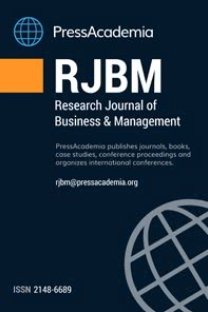BACK TO BASICS ON LEADERSHIP IN AN EMERGENT ECONOMY
Purpose- Leadership styles such as delegative, democratic, autocratic, and ethical leadership with respect to various aspects of trust and their causal relations along with determining the salient leadership style at public schools are the purpose of this research. Our assumption is that organizational trust is at the crux of human resource management since a healthy relationship between leaders and employees is a prerequisite for open communication, knowledge sharing and conflict management.Methodology- Our research question is to understand the basic relationships between leadership styles and trust between principals and teachers. We are conducting a survey at designated school sites. Our questionnaire is comprised of three sections: Socio-demographic variables, leadership styles and organizational trust.Findings- We have employed structural equation modelling (SEM) and found significant relationship between leadership styles and trust and vice versa. In sum, managerial trust has a significant effect on leadership styles which reveals the fact that dyadic relationships between leaders and employees enhance mutual trust.Conclusion- In sum, managerial trust has a significant effect on leadership styles which reveals the fact that dyadic relationships between leaders and employees enhance mutual trust. Such relationships need to be considered in human resource management (SHRM).
Keywords:
Leadership theories, SHRM SEM, trust and competencies,
___
- Adams, S. (2004). The Relationships Among Adult Attachment, General Self-Disclosure, and Perceived Organizational Trust: Dissertation submitted to the faculty of the Virginia Polytechnic Institute and State University In partial fulfillment of the requirements for the degree of, Doctor of Philosophy in Human Development.
- Ateş, G. (2005). Yöneticilerin Liderlik Tarzlarının Çalışanların İş Tatmini Üzerindeki etkileri: Hava Kuvvetleri Komutanlığında Uygulama. Kütahya: Dumlupınar Üniversitesi Sosyal Bilimler Enstitüsü Basılmamış Yüksek Lisans Tezi (unpublished graduate thesis).
- Barber, B. (1983). The Logic and Limits of Trust. New Jersey: Rutgers University Press.
- Begeç, S. (1999). Modern Liderlik Yaklaşımları ve Uygulaması. Gebze Yüksek Teknoloji Enstitüsü, Mühendislik ve Fen Bilimleri Enstitüsü.
- Bhatti, N., Maitlo, G. M., Shaikh, N., Hashmi, M. A., & Shaikh, F. M. (2012, February). The Impact of Autocratic and Democratic Leadership Style on Job Satisfaction. International Business Research, 5(2), 192-201. www.ccsenet.org/ibr (09.02.2019).
- Blomqvist, K., & Ståhle, P. (1998). Building Organizational Trust. 1-16.
- Brown, M., & Trevino, L. (2014). Do Role Models Matter? An Investigation of Role Modeling as an Antecedent of Perceived Ethical Leadership. Journal Bus Ethics, 122, 587–598.
- Buch, R., Martinsen, Ø. L., & Kuvaas, B. (2015). The Destructiveness of Laissez-Faire Leadership Behavior: The Mediating Role of Economic Leader–Member Exchange Relationships. Journal of Leadership & Organizational Studies, 22(11), 115-124.
- Clark, D. C., & Clark, S. N. (1997). Addressing Dilemmas Inherent in Educational Leadership Preparation Programs Through Collaborative Restructuring. Peabody Journal of Education, 72(2), 21-41.
- Clark, S., & Clark, D. (2003). Perspectives on Three Decades of the Middle Level Principalship. Middle School Leadership, 35(2), 48-54.
- Clark, S., & Clark, D. (2004). Expert Leadership and Comprehensive Professional Development: A Key to Quality Educators in Middle Schools. Middle School Journal, 35(4), 47-53.
- Csikszentmihalyi, Mihaly (1990). Flow: The Psychology of Optimal Experience. New York: Harper and Row.
- Hofstedte, G. (1980). Cultures and Organizations: Software of the Mind, N.Y.: McGraw-Hill.
- Jalava, J. (2006). Trust as a Decision: The Problems and Functions of Trust in Luhmannian Systems Theory. Helsinki: University of Helsinki, Faculty of Social Sciences,Department of Social Policy, Research Reports.
- Retrieved from http://ethesis.helsinki.fi/julkaisut/val/sospo/vk/jalava/trustasa.pdf (09.02.2018).
- Kanten, P. (2012). İş Görenlerde İşe Adanmanın ve Proaktif Davranışların Oluşumunda Örgütsel Güven ile Örgütsel Özdeşleşmenin Rolü. Isparta: T.C. Süleyman Demirel Üniversitesi Sosyal Bilimler Enstitüsü İşletme Anabilim Dalı Basılmamış Yüksek Lisans Doktora Tezi. (unpublished graduate thesis).
- Lewin, Lippitt & White (1939). Patterns of Aggressive Behavior in Experimentally Created “Social Climates”. Journal of Social Psychology, 10(2), 271-299.
- Luhmann, N. (1979). Trust and Power. John Wiley & Sons.
- Luhmann, N. (2000). Trust: Making and Breaking Cooperative Relations. G. Diego içinde, Familiarity, Confidence, Trust: Problems and Alternatives (p. 94-107). Oxford: University of Oxford.
- Mayer, R. C., Davis, J. H., & Schoorman, D. F. (1995). An Integrative Model of Organizational Trust. Academy ol Management Review, 20(3), 709-734.
- McAllister, D. J. (1995). Affect and Cognition Based Trust as Foundation for Interpersonal Cooperation in Organizations. Academy of Management Journal, 38(1), 24-59.
- Oshagbemi, T. and Gill, R. (2003). Differences in Leadership Styles and Behavior Across Hierarchical Levels in UK Organizations. Leadership Styles and Behaior. 25(1), 93-106.
- Pawar, D. V. (2014). Styles of Leadership. International Journal of Research in all Subjects in Multi Languages, 2(7), 12.
- Rast, D. E., Hogg, M. A., & Giessner, S. R. (2013). Self-uncertainty and Support for Autocratic Leadership. Self and Identity, 12(6), 635–649.
- Resick, C. J., Hargis, M. B., Shao, P., & Dust, S. B. (2013). Ethical Leadership, Moral Equity Judgments, and Discretionary Workplace Behavior. Human Relations, 66(7), 951-972.
- Scott, D., & Cook, B. (1983). The Relationship Between Employee Age and Interpersonal Trust Within an Organizational Context. School of Business: Faculty Publications and Other Works, 69-83.
- Seppanen, R., Blomqvist, K., & Sundqvist, S. (2007). Measuring Inter-Organizational Trust—A Critical Review of the Empirical Research in 1990–2003. Industrial Marketing Management, 36, 249 – 265.
- Tuna, M., Bircan, H., & Yeşiltaş, M. (2012). Etik Liderlik Ölçeğinin Geçerlilik ve Güvenilirlik Çalışması: Antalya Örneği. Atatürk Üniversitesi İktisadi ve İdari Bilimler Dergisi, 26(2), 143-155.
- Vidotto, G., Vicentini, M., Argentero, P., & Bromiley, P. (2008). Assessment of Organizational Trust: Italian Adaptation and Factorial Validity of the Organizational Trust Inventory. Social Indicators Research Springer, 88, 563-575. https://link.springer.com/journal/11205 (06.09.2018).
- Yayın Aralığı: Yılda 4 Sayı
- Başlangıç: 2014
- Yayıncı: PressAcademia
